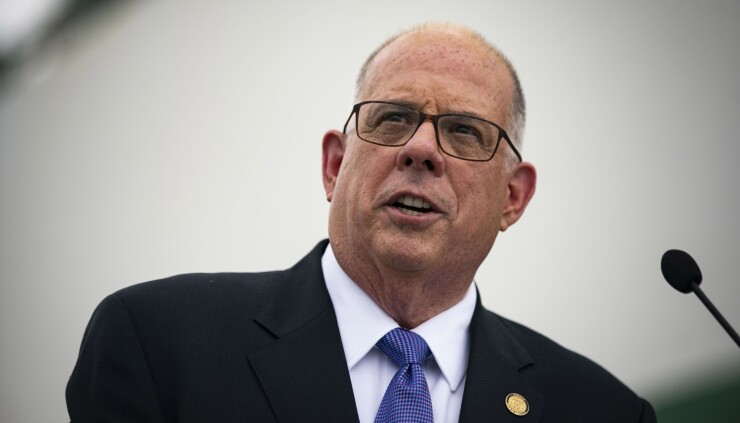Maryland Gov. Larry Hogan blamed what he dubbed anti-transit activists for the delays and cost overruns that have plagued the state’s troubled public-private Purple Line transit project.
And better communication will be key to avoiding similar challenges with future P3s, said Matthew Pollack, executive director of transit development and delivery at the Maryland Department of Transportation Maryland Transit Administration.

The comments came Wednesday at a Maryland Board of Public Works meeting where the board approved a revamped P3 contract and financial plan to restart full-scale construction and put the Purple Line on track for a fall 2026 opening.
The amended P3 brings in a new design-build contractor and features a few risk changes, like dropping a termination right that the previous contractor used to halt work. It reflects a substantially increased price tag of $9.28 billion, up from $5.6 billion.
Wednesday’s vote of 3-0 also means MDOT MTA, which owns and oversees the Purple Line, can
One of only two P3 transit projects in the U.S., the 16.2-mile, 21-station Purple Line project stumbled after a 2016 lawsuit filed by the Friends of Capital Crescent Trail pulled the project's Record of Decision. The state eventually won, but the court battle led to the loss of roughly 16 months of work.
“It was these anti-transit activists that brought a frivolous lawsuit that tied us up for years and years, which is primarily the reason for all the delays and cost overruns,” said Hogan, one of three Board of Public Works members, along with Comptroller Peter Franchot and Treasurer Dereck Davis.
The state “pretty much terminated” the contract with the original contractor “because we thought we were being gouged,” Hogan said, referring to the contractor’s estimate of $800 million in increased costs.
“I’m pretty proud of the team,” the governor added. “It’s a huge project with huge obstacles but they kept the ball moving; no matter how many times there was a setback from the outside, they kept moving.”
Construction was roughly 40% complete when the original design-build contractor
“One of the most important things is the level of communication that needs to take place throughout the project, not just at the senior level,” Pollack said in response to a question from Comptroller Franchot about what lessons MDOT MTA has learned. “All the communication has to take place at all levels. We need to continue to drive ourselves toward that common goal and we need to partner at that level.”
The meeting marked the first for new Maryland DOT Secretary James Ports, who took over two weeks ago.
“This is a doozy of a proposal" for Ports to bring at his first meeting, Franchot joked. “I’m delighted it has support,” Franchot added. “To the extent we can put this one behind us and have future projects on budget and on time, we’d be grateful.”
The concessionaire, Purple Line Transit Partners, is made up of Meridiam and Star America. The new design-build contractor is comprised of Dragados USA and OHL USA.





